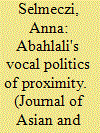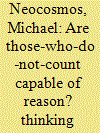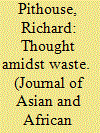|
|
|
Sort Order |
|
|
|
Items / Page
|
|
|
|
|
|
|
| Srl | Item |
| 1 |
ID:
117769


|
|
|
|
|
| Publication |
2012.
|
| Summary/Abstract |
Using as its point of departure the claim that today the urban is the main site for the abandonment of superfluous people, this article explores the emancipatory politics of the South African shack-dwellers' movement, Abahlali baseMjondolo. Based on a notion of political subjectivization as the appropriation of excess freedom, I argue that Abahlali disrupt the order of the 'world-class city' when they expose the contradiction between the democratic inscriptions of equality and the lethal segmentation of the urban order. In articulating their living conditions as the unjustified breach of the promise of 'a better life', the shack-dwellers prove their equality and thus emerge as political subjects. As the article argues, at the centre of this process is a political practice of speaking and listening that is driven by the imperative to reverse the distancing and delaying practices of an order that abandons them by remaining physically, experientially and cognitively proximate to the experiences of life in the shantytown.
|
|
|
|
|
|
|
|
|
|
|
|
|
|
|
|
| 2 |
ID:
117771


|
|
|
|
|
| Publication |
2012.
|
| Summary/Abstract |
This article is concerned to show that the historical science of the (neo-)colonial world is unable to allow for an analysis of the political subjectivities of 'those-who-do-not-count' or 'subalterns' as rational beings. Rather, it can only think such subjectivities as the products of people who are merely bearers of their social location, not thinking subjects. As a result, such history can only be a history of place, not a history of the transcending of place; it therefore amounts to colonial or state history. Historical objectivity invariably produces state history. The thought of the possibility of emancipatory politics, which always exceeds place, is thus precluded. This is an unavoidable epistemic problem in history and the social sciences in their current form. Following the work of Lazarus, I argue for an alternative historical methodology in Africa in terms of an internal analysis of the idioms of politics as discontinuous subjective sequences.
|
|
|
|
|
|
|
|
|
|
|
|
|
|
|
|
| 3 |
ID:
117773


|
|
|
|
|
| Publication |
2012.
|
| Summary/Abstract |
This article analyzes the debates surrounding the inadequate medical care reportedly offered to Steve Biko during the final weeks of his life in 1977. For the past three decades, medical ethicists have used the so-called 'Biko Case' to define the ethical obligations of medical practitioners who operate under systems of authoritarian rule. This evaluation of Biko's death has reduced the history of apartheid to a narrative of political repression. This article argues that this process of clarifying ethical medical practices through a contrast with repressive power fails to account for the ways in which medical care itself acts as a form of power. In other words, a narrow focus on the effects of repressive power provides an insufficient strategy for evaluating both the history of Steve Biko's death and of apartheid power more broadly.
|
|
|
|
|
|
|
|
|
|
|
|
|
|
|
|
| 4 |
ID:
117768


|
|
|
|
|
| Publication |
2012.
|
| Summary/Abstract |
This paper begins by noting that some forms of leftism reinforce rather than oppose the exclusion of the urban poor from the agora. It shows that neither the capacity for intellectual nor for ethical seriousness can be read off a sociological location and suggests that a humanism made, in Cesaire's terms, 'to the measure of the world', a commitment to a universal ethic, is necessary if the humanity, and therefore the prospect of political agency, on the part of all people is to be recognized. It concludes by arguing that recent debates about a return to a communist Idea need to be mindful of a history in which communism has been a form of imperialism rather than a genuinely universal ideal.
|
|
|
|
|
|
|
|
|
|
|
|
|
|
|
|
| 5 |
ID:
117770


|
|
|
|
|
| Publication |
2012.
|
| Summary/Abstract |
The article presents an anthropological case study of workers' forms of thinking and subjectivity as they appeared at Autofirst, during a strike which took place in December 1998, in South Africa. After conceptualizing my approach as a 'post-classist' analysis following the work of the French political anthropologist Sylvain Lazarus and presenting my methodology, I focus on the problematic word 'happy' and its meaning in the specific subjective sequence. I show how the interviewees' prescriptions that 'a happy worker is a quality worker' and that 'the worker should be happy' as much as management, are indications of the workers' own logic and vision on what is possible in the factory in terms of relationships between management and workforce, during the early post-apartheid period. I contend that a 'classist' vision of capital and labour would not allow us to comprehend the issues at stake in the strike and in South African industry as a whole at that particular moment in time. Finally, I demonstrate the sequential existence of the factory as a place of engagement and of communication between 1995 and 1998, in contrast to the 'apartheid of speech' which, from the workers' point of view, had previously characterized it.
|
|
|
|
|
|
|
|
|
|
|
|
|
|
|
|
| 6 |
ID:
117772


|
|
|
|
|
| Publication |
2012.
|
| Summary/Abstract |
If, as Spinoza suggests, sadness is an inadequate idea, how do we account for its mobilization in nationalist and post-colonial critiques of colonialism, neo-colonialism and neo-liberalism? How, in other words, might we see in the inadequate idea of sadness the very conditions for thinking our way into a discussion of political subjectivity that loosens the grip of biopolitics on African subjectivity? Drawing on aesthetic practices of art and film, this article argues that a fundamental shift is discernable in the careful ways in which the affect of sadness has been worked over by artists and filmmakers in Africa. This is a site of productive reworking, which not only eclipses the exhausted political sphere in Africa, but offers ways to theorize its reconstitution. To this end, the article asks that we attend to the ways in which potentiality and impotentiality are rendered as central premises for tackling the question of the renewal of political subjectivity in Africa.
|
|
|
|
|
|
|
|
|
|
|
|
|
|
|
|
|
|
|
|
|